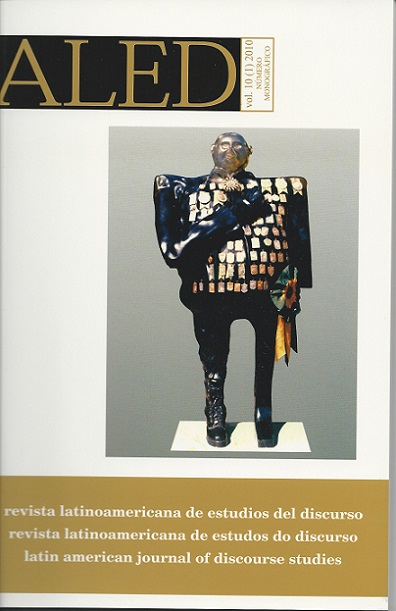La metáfora conceptual en el discurso político venezolano
Rómulo Betancourt y Hugo Chávez Frías
Keywords:
venezuelan political discourse. conceptual metaphors. relevance.Abstract
Political discourse constitutes a form of domination. Numerous strategies are used in its structuring, and among them the conceptual metaphor, a symbolic device that simplifies complex aspects and justifies the actions undertaken. However, this figure does not always possess the same level of relevance. For this reason, based on the theoretical-methodological scaffolding given by critical discourse analysis, cognitive linguistics and relevance theory, the objective of this paper is to analyze the political-ideological dimension of figurative language, particularly the uses of conceptual metaphors in Venezuelan political discourse. The relationship between the metaphors employed, the context where they are produced, and the ideology of the producers are of particular interest. The data of the investigation is constituted by discourses of the Venezuelan presidents Rómulo Betancourt (1945-48 and 1958-64) and Hugo Chávez (1998-2006). The following conclusions stand out: according to their level of relevance, these figures allow us to understand the speaker´s conceptual system; furthermore, they reinforce the cohesion and mobilize groups because, although not ideological in themselves, political discourse ideologizes them.
Downloads
References
Althusser, L. (1988). Ideología y aparatos ideológicos del estado. Freud y Lacan. Buenos Aires: Nueva Visión.
Billig, M. y Mac Millan, K. (2005). Metaphor, idiom and ideology: the search for “no smoking gums” across time. Discourse & Society, 16, pp. 459-489.
Cebrián, S. (2005). Papel de la metáfora en el discurso ordinario. [Documento en línea] Disponible: www.uji.es/bin/publ/edicions/jfi8/hum/2.pdf [Consulta: 15-07-05].
Chiang, W. y Duann, R. (2007). Conceptual metaphors for SARS between whom? Discourse & Society, 18, pp. 579-601.
Chilton, P. e Ilyin, M. (1993). Metaphor in political discourse: the case of the “common European house”, Discourse & Society, 4, 1, pp.7-31.
Chumaceiro, I. (2004). Las metáforas políticas en el discurso de dos líderes venezolanos: Hugo Chávez y Enrique Mendoza. Revista Latinoamericana de Estudios del Discurso, 4, 2. pp. 91-113.
Coelho, S. (2007). Metafora e argumentaçao: uma abordagem cognitivo-discursiva. Linguagem em (Dis)curso, 7, 3, pp. 487-506.
Cuenca, M. y Hilferty, J. (1999). Introducción a la lingüística cognitiva. Barcelona: Ariel.
Cuvardic, D. (2004). La metáfora en el discurso político. Reflexiones, 83, 2, pp. 1021-1209.
Díaz, F. (1999). Una aproximación al uso de la metáfora en la publicidad británica y en la española desde la teoría de la relevancia. Pragmalingüística, 7, pp.45-64
Díaz Rojo, J. (1994). Las metáforas sobre la situación política española en la primavera de 1994 a través de los medios de comunicación. Español actual, 62, pp. 55-66.
Hernández, M.L. (2004). La metáfora política en la prensa venezolana: un estudio lingüístico cognitivo. Opción, 20, 44. pp. 56-77.
Lakoff, G. y Johnson, M. (1980). Metáforas de la vida cotidiana. Madrid: Cátedra.
Lizcano, E. (2008). Narraciones de la crisis: viejos fetiches con caras nuevas. [Documento en línea] Disponible: Archipiélago (83-88) www.archipielago-ed.com [Consulta: 23-11-08]
Molero, L. (2002). El personalismo en el discurso político venezolano. Un enfoque semántico y pragmático. Convergencia, 29. pp. 56-99.
Molero, L. (2009). La metáfora en el discurso político venezolano, en M. Shiro,P. Bentivoglio y F. D. Erlich (compiladoras) Haciendo discurso. Homenaje a Adriana Bolívar, 305- 332. Caracas: Universidad Central de Venezuela.
Santibáñez, C. (2009). Metáfora y argumentación: lugar y función de las metáforas conceptuales en la actividad argumentativa. Signos, 42, 70, pp. 245-269.
Sperber, D. y Wilson, D. (1994). La relevancia. Comunicación y procesos cognoscitivos. Madrid: Visión.
Steinert, H. (2003). The indispensable metaphor of war: on populist politics and the contradictions of the state’s monopoly of force. Theoretical criminology, 7, 3, pp. 265-291.
Thompson. J.B. (1993). Ideología y cultura moderna. México: UEM Xochimilco.
Wei-Lun, L. y Ahrens K. (2008). Ideological influence on building metaphors in Taiwanese presidential speeches. Discourse & Society, 19, pp. 383-408.
Wodak, R. y Meyer, M. (2003). Métodos de análisis crítico del discurso. Barcelona: Gedisa.
Downloads
Published
How to Cite
Issue
Section
License

This work is licensed under a Creative Commons Attribution-NonCommercial-NoDerivatives 4.0 International License.
The authors retain the copyright and guarantee RALED the right to be the first publication of the work as well as a Creative Commons Attribution License that allows others to share the work with recognition of authorship and the initial publication in this journal.




